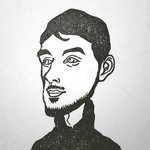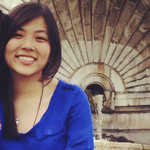

I'm bound for Euclid avenue. Euclid, because i was bleary and i got on the shuttle the wrong way, so no courtelou, and really no reason to turn around...
September 1st, 2013, 5pm
It was 27.2°C. The wind was calm.
…And right the wrong, because there is no wrong; this was never about cortelyou; the point was to reach the end of a subway line, any line, and the end of the c is a dot marked Euclid.
This is what I do, some days. Certain days. When I’m tired of sameness. Tired of my same street. Tired of the room where I wake up and turn off the white noise and unroll the yoga mat and try, at the same desk, to do my work. To write what I can.
I aim for the end of the line when I need to travel but have no plane ticket. I pick a subway, a color, a chute on the map, and I don’t get off until almost everyone’s gone.
Today is one of those days. Fatigue is squinting up my eyes. Making them feel like slits.You can read from the creases down my hairline that I’m fresh out of a deep nap, god knows how long of one, face down on my couch, hurting through the second hangover in two days.
I want to be on the other side of this weekend. I always want to be on the other side of the weekend. I’m better at weekdays than weekends and this one’s long. People who have normal jobs and so relish weekends, do better at weekending, have an extra day to not-labor. Right outside my apartment, the street is thumping with parade, thick with cops. I should have gone away. Everyone but kids in costume, people at barbeques, police on corners, went away. The people with means went away. All the white people on franklin avenue went somewhere near or faraway.
There’s a sleepy feel at the end of the subway line, always. A sense of people rising with a groan, like the tired exhale of a train who’s done, who can sit for a while now. The Euclid stop is like this. No one’s about to charge up the steps. At the top of the steps, I stare at a sign that reads BATHROOM. A fact worth writing down, bringing home. I will tell friends in the rest of new york, in the heart of new york, that if you can make it to the end of the C line, the reward is a restroom. Will anyone believe me that it’s clean?
That’s the miracle of the end of the subway line. Sparkle. Relative sparkle. It makes sense, when you think of it. So few people, relatively, pour through here.
I have no idea where I am, up on the street. There was an urge, not a plan. A loading of every possible book and notebook a more wakeful version of myself might want into a bag, and out the door, hopeful that with caffeine, with a long train ride, with a hearty swig of unknown, I might feel like myself again. Awake.
Up on the street, wherever this is, I look for a place to sit and write and slurp through coffee someone will refill, generously. Up on the street, it does not look good. It never looks good, at the end of the subway line in New york. On its fringes, I mean. subway line don’t end in Manhattan. They shoot out, far. They run until the crowds are gone. The pushers dispersed. They end on the streets whose names commuters hear all the time—Flatbush Avenue, Brooklyn College, Stillwell Avenue—but few see. They end at the last places you can be publicly transported, underground at least. Beyond which, you’re on your own.
I see signs for check cashing, first. Yellow awnings shading cheap toys and kitchen stuff. Asking around for a diner means getting pointed towards Dunkin Donuts. Everyone wants me to go to Dunkin Donuts. One guy says Popeyes. He’s sitting in a lawn chair outside a plain, flat-faced brick home, like someone ready to watch the parade. There is no parade here. There is McDonalds and Popeyes and Dunkin Donuts.
I know better than to give up. I know feeling like a fool is par for the course, that the temptation to run like a mouse for the tunnel down which I came will strike within the first block. I’m ready for the temptation to skulk back to a cafe for white people, where a Barista is pouring stumptown, where there is Splenda. It helps that I’m sick of cafes for white people. Sick of stumptown. Sick of my street and the way I describe it to people who’ve heard the hype or men I’m dating who know nothing at all. Sick of “the most quickly gentrifying street in Brooklyn.” Sick of the examples I toss out: cheese shop, french cafe, Stork.
And I know better, because this is New York. There is no such thing as a desert of food. There is always somewhere to eat a very delicious and probably unique if not impossible to forget dish. There isn’t. If we called my End of the Subway line journeys a hunt to find a food desert on the edge of NY city, I’d be losing. There is none.
But Euclid. Euclid: you’re a little bit grim. I walk into smells that I can’t source until I walk into a smell I know immediately from the volunteering years. That’s nursing home food. Terrible, over-salted, made-for-the-masses (and not the private-paying) nursing home food. Sure enough, on the corner, the smokers are out for a break, their faces sunken, a few despondent people crouched on the ground. It’s a home for the aged filled with the simply helpless, across the street from that Popeyes.
I cross the street, away from Popeye’s. My only compass is Popeye’s. Hangovers make me blue because they do, it’s something chemical, and because the lost vitality makes everything worse. The lost vitality—the squinty state, the grey face— sends me right down the spiral, because the vitality feels like me. Without it, it’s hard to enjoy myself or like myself or be anything but hard on myself.
But Euclid. She who feels sorry for herself—who’s lost sight of the fact that the haze of two days of drinking cocktails on too many dates with men she doesn’t care to see again, needs only to smell institutional lunch. I’m reminded what it is I’m exercising: freedom. And then of my primary goal: to find and eat something so delicious I write about it.
The opposite of an institutional lunch: food for an ode.
There’s a triangle of grass I can’t quite call a park; it’s fairground messy, strewn with days or weeks-old trash. I cut across it. I walk in the direction of whoever’s blaring Indian music, a Bollywood tune but racier sounding, more thump in it, something of hiphop in it. The track of a movie in which they actually kiss.
I find three very attractive Indian man working on their cars, tools spread on the sidewalk. A scene from the kind of weekend I never have. One of the hot men says hello, and so I ask my question, brightly, with purpose.
A diner?
All three perk up, toss suggestions, compete. They point me left and also right down that just-ahead street.
“Which way?” I smile at their conflicting fingers. I smile, too, because I can tell from their suggestions that I’m fine now; I’ve reached the place where someone not called Popeye will sell me coffee.
“Either way.”
Right, then. I hang a right on Liberty Street. Much better. Every storefront is used. Every window: crowded and colored with things to buy. You can hand over money and get stuff back all down Liberty Street.
WE BUY GOLD, Liberty Avenue says. CHECKS CASHED, it offers, again. Again. TRUE FLAVORZ, it says. PASSPORT PHOTO and BKLYN CAPS. Liberty Avenue promises a whole hell of a lot for 1 dollar. At every third storefront on Liberty Avenue, you can do something to your hair or nails. At every fifth, you can buy something for one dollar.
I catch Spanish in snatches. Vamos without the s, which I think means the DR. Maybe PR. I pass a man who looks Indian holding one long beautiful note like I wish I could hold my yoga ‘om.’ He’s holding it for a friend, another man, who’s smiling, looking away. They’re outside their shop. Everyone’s outside their shop. Again: the parade thing. But no parade. Just tons of people shopping, a world of people shopping, the world all mixed up and paraded down Liberty Avenue, shopping.
I know where to go from the burger on the awning: Grant’s Cafe. I trust the word “corned beef” in a window. My hopes rise, reading the words corned beef. Inside: the sound of whisking. Eggs getting scrambled in a silver bowl, I imagine, the visual so clear. Scrape scrape scrape. The only louder sound is plates. They are thick; they are white; they are diner plates.
Grant’s is busy.
Grant’s has serious turnover. I can tell. The motion, the layers of sound. That many plates; someone’s washing and stacking them constantly. Devoted, all day, to plates.
I slide into the orange seats. This is booth nine, a sticker tells me. A sticker like you’d find on a rural mailbox. Booth nine out of maybe 12, 14 at the most. I hear every kitchen order called out, and half- translate them, because they’re half Spanish. “Dame un waffle!” “Papas Fritas con queso!” “FRENCH! toast.”
Grant’s is small. Busy, small, a box of brunch noise.
What neighborhood is this? I ask the waitress.
She is sweet-faced, Central American (or so I guess), and has no idea where this is. “Im not from here,” she says. I must look surprised, or just unsatisfied. She takes a stab at defining where we are: “Mostly Spanish. Some Indian.”
Mostly Spanish. It will never cease to be strange to me that a dozen-some immigrant groups get shooed under the umbrella of their language, as though that was plenty in the way of definition. As though all that we need to know about Salvadorenans and Peruvians, Argentines and Cubans is that they speak Spanish.
She leaves me to the menu, says take your time. I listen to the diner sounds, and decide I want an MP3 of diner sounds. All these layers make music. I listen to the craggy craggy voice of someone’s grandmother in a nearby booth, her mira’s, her ay’s. I listen to someone in the kitchen profess speed: voy voy voy. I remember Cuba, the DR, answering whoever called me to the telephone, VOY. A promise that I’d heard, that I was coming.
Yo también voy-voy-voy, says a male voice back. They’re having fun over the half-wall, by the sizzle, the whisking, the thunk of diner plates. They’re making me nostalgic for my high school job, the roast beef place, the roast beef and also frozen custard place. The ever-busy, slammed by little league teams place. Where a 15 year old bussing tables was never bored.
I see my waitress give the guy working the griddle a playful punch to the arm. One thing I do love about my country : that we have all, most of us at least, worked a job like this. We’ve bussed. We’ve called back orders. We’ve flirted with guys by the friers or the freezers we’d never actually kiss. This is not the case, I know, in most countries, not the Spanish speaking ones nearby. I guess this is my one patriotic thought on the day before labor day: loving that few get away without getting their hands dirty in America.
There’s no corned beef on the menu, and I don’t hide that I’m crestfallen. “People didn’t order it,” the waitress apologizes for the recent death of corned beef at Grant’s.
But pastrami. Isn’t that just like corned beef? I order it, then realize I don’t know.
I listen for my order called out, excited. Pastrami! I catch my mustard turned to mostaza. A voice from the back clarifies untoasted? Untoasted.
New York has taught me many things. Many of them are about food. One of them is to say toasted, because toasted here means pressed into a griddle with years of layer of grease, and another is to take it back, no: untoasted. You want untoasted, because bread in new york diners was just made that day. You want to taste the bakery. That’s why you walked past Popeye’s, to Grant’s. You walked farther not to guard your health; don’t kid yourself, don’t self-congratulate. You did this to taste New York. You won’t last here if you don’t find ways to taste New York.
The menu at Grant’s banners over the kitchen, in four or five lists. Everything on the menu ends with .95 or 25. Mostly 95. Many things on the menu end with ON HERO or WITH BACON or WITH FRENCH FRIES, in thicker letters, like important afterthoughts. Nothing on the menu is what anyone would call Spanish.
I open my bag: a blank journal, Sontag’s journal, two more notebooks I thought maybe I’d dig into if I could clear the hangover sludge I woke up to, right behind my eyes. I open my journal, and also Sontag’s. She wrote notes on grim days. They are her best notes, if you ask me, on my own grim days. What’s happening in my life the day I reach the end of the C line in Brooklyn? I’m dating too much, again. I’ve bounced from total hiatus into a fugue of new e-ways to scope and thumbs up and instantaneously meet for cocktails the single men in my age bracket and geographical vicinity. “I am flying through men,” I texted my roommate last night, trying to give the weekend events a self-flattering spin, joking about the trend: doctors whose names I need help pronouncing. Hlynur. Amin. Lou.
Lou wasn’t hard to pronounce, nor was he a doctor. But I did forget to ask what his name was in the first place before agreeing to meet for a margarita where I have met more men than I’m willing to count, sat with on the same stools, ordered from the same bartender who does me the favor of not remembering how many times I’ve had a margarita or Bohemia or negro modelo across from a man who picked up the check. It’s called Chavelas’s . It’s on Franklin, two blocks from my home, my office, my base. I am sick of my street in part because I only date there. I make them come to me. I keep busy until they surface and text. I can get home quickly and usually do. “Another one bites the dust,” I sing out to my roommate, into our hall, before the door’s even clicked shut. Another one bites the dust: our theme song, as summer turns to fall. It helps, in the aftermath. We spin our outcomes helpfully, comically. She’s writing an essay about all these men, and so, it now seems, am I. Another one bites the dust, I sing to Leslie. I’m a suitor killer, not alone.
Lou was the dud; Hlynur the nice surprise; Amin the surprise disappointment. Amin was the great texter, the first cause for hope in a while (a month). On Hlynur, I’d nearly canceled. His photos were grainy. That friend off to the right looked deeply geeky. His jeans gave me pause. It was entirely possible he was completely unattractive. Also: His name was Hlynur and he sounded not that excited when I pegged him for Icelandic.
But Hlynur won. He killed Lou. Even with a stutter, ever so slight, Hlynur won. Every half hour: a word Hlynur nearly didn’t get out. He was cute. Extremely. I said yes to the second cocktail. Which is, for someone of a normal composition, like agreeing to a quick kegs stand after emptying a bottle of bubbly. I am not a person who should drink. So the long weekend began. An apple for dinner. Cheers.
Amin? Here’s what I’ll remember about Amin. That I fit him in after Lou, because Lou was so deadening, so dull. I couldn’t just go to bed. I was wrecked, that liquor wince right behind my eyes, but wanted better outcomes. And Amin was such a texter, there to text, easy to coax. We still hadn’t met. I could just…text.
Amin drove to Crown Heights from the Upper Upper East Side, hungover himself. Here’s what else I will remember about Amin: Asking him if he knew anything about rheumatoid arthritis, because he was a doctor, and my mom had just told me she has it, and I’d been too busy dating men from the internet to sit down at the internet and ask it questions about my mother’s now daily pain.
Amin knew about rheumatoid arthritis. The way he talked me through rhematoid arthritis told me he was a very, good man. I’d need to be kind to him, tomorrow, in ratcheting our text messaging down from half-hourly to none. I already knew he was out. I knew instantly. I’d try to explain to Leslie, later, and find so few words: “He was thick.”
Rheumatoid wasn’t terrible, he said. It was worst in the morning. It was made better by exercising, which she could do; which of course she’d do, my mother. It wasn’t terrible, he repeated, maybe because my eyes had a gleam in the dim bar. We were two blocks away from Franklin. My pick.
Amin must have thought the gleam was love, and sadness, and the sudden awareness that people we can’t lose will someday be lost. Dark thoughts about From-here-on-out. Thoughts about things only getting worse, and weaker and fainter, about the slow but inevitable course of loss. Those were my thoughts: all of the above. And with them, the sadness of holding them alongside a man I’d just met. Who felt more familiar in his texts, somehow, than in the same room, as himself. The real Amin.
I shouldn’t have had a cocktail. The last thing I should have done on night two of the long weekend was drink another kind of hard alcohol. Rum. A too tart rum cocktail. Not even cold enough. I wished there was a kosher way to drop in an ice cube. The tiny, fancy glass was too full. I love and hate Brooklyn in these moments. The Brooklyn of cocktail bars that try this hard. Charge this much. Claim such sophisticated mixology, only to send me home hungover as a college kid.
What I hate most about hangovers is how I eat through them. Like a freak, all day. Hangovers put a tremble in my hands, impatience in my saliva, the need for a flavor that doesn’t exist, that I nonetheless try to find all day. Chewing through packs of cinnamon gum. Spooning through pumpkin pie paste. Thinking for hours about ice cream, then dismaying at a chocolate banana smoothie I can hardly taste. Maybe because Big Red has eroded the inside of my mouth.
One look at my pastrami and I know it’s my cure. This pastrami is the beginning of my resurrection. The end of a two-day ache, once and for all. I go at it like a refugee. The rye falls to pieces; it’s not seeded like I hoped but the pickle is perfection. A little green log, a little log I cut up affectionately in pieces. I might ask where it’s from. I imagine being told “a jar,” and feeling dumb but still as excited about my pickle. It is perfect.
A landline phone chirps out, unanswered for a couple rings. Like everyone’s forgotten how we answer that noise. That 1990’s ruckus. How to shut it off? I’ve had my own phone shut off all day—the internet part. It’s almost three in the afternoon and that part of my phone is still sleeping. I’m afraid to turn it on and see today’s storm of congratulations from dating apps and the names of BrooklynGuy82 and 79 scoping me out and a text message from Amin with all too many exclamations and capital letters and a photo, too, with hints of his home life—the faint blue blanket on the couch I’ll never see. The couch he’ll text me from, once or twice more, before giving up, forgetting completely. Remembering a person named Colleen only the next time someone mentions Rheumatoid.
My phone’s sleeping because I don’t yet want to know that Hylnur hasn’t texted, yet, and that of course Lou hasn’t either and that someone via HowAboutWe is checking me out. That the two or three hundredth lame or lonely or just vague sounding dude from HowAboutWe is for another quarter of second, checking me out.
Mostly, I’m dreading a message from the man I usually date, who’s away at a Lake, whose invitation to the lake I declined, set on dating other men, because Ajay is great, but not convincing me. Because I’m not convinced by us, still. Six months into dating him in the most half-hearted fashion, I’m hunting. My phone is sleeping because the hunt is like playing the slot-machines every three minutes of your otherwise functional life, a life that might even feel good, were it not for closet gambling. What you do with your thumbs, whenever idle. Today, I can’t bear the notifications. I’m sick of many things. My street, my office, my routes, my teas, dishes, all the dishes created by working at home. I’m sick of nothing more than constant men I don’t like enough. I’m sick of the rapidity, the constancy, the water-through-fingers feeling of what’s now romance in New York City.
There is a bald black man, many booths away, up at #2 or 3, who keeps sending his gaze at to me. If anyone sees me dip pastrami in the extra mustard, watches me smear coleslaw on the untoasted bread, sees me look around futilely for another napkin because I’ve sullied two, it’s the man in booth 2/3. What is he thinking? Refugee? Hungover? White chick bulimic?
But Pastrami! Oh Pastrami. You are not corned beef. You are bacon’s soft cousin. Less stubborn, less dense. Pastrami folds. It tucks right into bread, accepts mustard. Wears a few less coats of grease. Pastrami offers comfort, in butter and flavor; pastrami makes it impossible, for a good long while, to crave anything else.
I sit still and write in my booth. I love New York when it lets me be alone in a humming room. My waitress is too busy to even flag for water. Pastrami and pickles and diner coffee. For a time, there is no hangover. I’m full. I’ll go back soon, remade, from Euclid Avenue to Franklin. I’ve gotten what I needed to start over, in my daily life. Ways of resurrecting: mine are strange but sure. I can always get up. There’s that. Self-destruction. But self-resurrection.
I look up and see a man with a walker rising to wheel off, his pancakes eaten. He waves past me. At me? There’s no one behind me; that family just left. Their daughter played toys against my shoulder and then left. Yes, he’s waving to me. I hazard a wave back. He calls out,
EVERYBODY BE WELL!
As if to say, yes, you dear, but really anyone. everyone. This is how you know people live alone, are alone, in New York City. They can’t turn around, can’t go back inside, without some human transaction. I do this, sometimes, too. On long writing days, I play the old man. I am so the old man, scrounging around for some humanity. I find something to bounce words off of; I put something in the air someone will hear. I wait around for something back. It comes easy, intimacy with strangers. It’s the intimacy I find weirdly easy. It’s why a day like this, in a neighborhood I still can’t name (Spanish?), feels not just right, but good. A weekend to my taste. A very strange holiday very suited to me.
I walk off, thinking about loneliness. About why I don’t just fix mine. The end of the subway line—this one, and the others (the 2/3, the Q)— remind me that I like it, being alone. Under the right conditions. I like aloneness with some charge of the unknown. A dash of risk. Things to notice. A walk for really noticing, really reading signs, the way they sit on stoops, what they mutter to their kids. A walk for wondering what those characters are, guessing Hindi. A place that pushes stories right through me; a break from pulling them out.
I walk down Liberty, feeling, finally, on the other side of the weekend. I woke up so early this morning I said my own name aloud like my own mother would: Col-leen. I clucked at myself, knowing how many more hours I needed, knowing I wouldn’t get them. I woke up to the sound of my roommate’s giggle through the door. Her dates went better than mine. We had an overnight guest, a name from the internet that became a man who got through our door on Franklin. Dennis did not bite the dust. Not in the mood to chat with him, I slipped out, used the bathroom at the hipster cafe across the street, before fleeing to the C train.
Late last night, I got a photo text of a boat on a lake. It was from Ajay, reaching me, just before I met Amin. His timing: always like this. His texts: plucks at my guilt strings. Rightfully so. Unwitting, but rightful. I kept walking towards Amin but looked hungrily at the photo, at the friends whose names I knew but hadn’t yet met, hungry to read whether I’d like them, whether Id be having a good time, whether I should have gone to the lake, done what other people do with labor day weekends, go away, with friends, to lakes.
But everyone in the photo was looking away. There were just two women, both pregnant. One’s belly was a shelf. No one was talking. I thought of Ajay, at the stern of the boat, taking the photo, and wondered why he didn’t have a worse feeling about me. Why one of these friends on the boat didn’t ask what was up, underscore what was off, with the girl they still hadn’t met.
The subway station is easy to find again. Euclid Avenue. Losing myself in a place makes it etch hard in the mind. Needing to get my bearings, I do. I could find my way back to Grant’s, any day. I think about doing that. I think maybe that’s what I’m doing, in aiming for the ends of the lines that cut through and under and over the parallel bridges of my city. I’m collecting points of return, maybe. Faraway Places to aim for, on days that I can get only so far away. When I wake up on Franklin, in the sameness, needing to get out of it, fast. I can aim straight for Euclid. I can just find Grant’s, get a booth.
Underground, there are women in saris. All six of them, the exact same height. Their saris aren’t the rich citrus tones of India, but pastels, a soft turquoise. I’ve learned this non-neighborhood is East Indian. Full of Bangladeshi’s. I paused at a grocer where I recognized only thirty percent of the produce. I picked up Seussian green fruits the grocer had no English words to name. I bought purple pea pods. He said sure, just boil them. Add pepper. In my kitchen, later, they’d sit there like a souvenir, looking painted, to be seen not used.
Watching the women in pastel sari’s, I remember the West Indian man on the corner by Grant’s cafe puzzling over my question: what neighborhood is this?
“What do you mean, neighborhood?”
I had three seconds to explain what I mean by a neighborhood— he had customers, rack perusers, shoe buyers— and I failed (Like I’m from Crown Heights—what’s this?).
All he could offer is the name of the street: Liberty avenue. Down the block, I got the same answer, with a bonus possibility, like we were all guessers here: “City Line.”
I repeated it. City line. I’m walking across a board game today. Once I’m back on the other side of the train tunnel, the Franklin side, all the signs and words and names of places will resonate again, sound solid, Brooklynese, places everyone agrees on, repeats.
Here, place names are make-believe. City line. What do you mean, neighborhood?
A man selling water in bottles offered me a few more clues. His name was Tony. His hat was white. So were his shorts, his shirt. My confusion didn’t confuse him: I was between places, he explained. A bunch of places. That was the problem. City Line is the street of shops (it clicks into place—not a street of shops; THE street of shops. A destination I almost didn’t find. Thank you Bollywood beats; thank you men tooling around).
Tony pointed off in the distance, past the nursing home, over Popeye’s. That was East New York. And somewhere past that was Ozone Park.
The most make-believe name of all. Ozone + Park.
Next time.
Back underground, you don’t have to scurry onboard the C train. I forget that. I scurry towards the open doors, then sit on a C train that takes its time filling. No one looks rushed; there’s no rush at the end of the subway line, where trains sit, sleepy caterpillars. Ours trundles off, soon reaching that familiar cruise, those soft banging sounds we know too well to really hear most days.
Other moments in New York
-
Espressoing
in New York, United States -
A few more days
in New York, United States -
Goodbye
A final Hi meeting
in New York, United States -
meditation, Creativity
The local neighborhood bar has a quiet time between six and nine. It is a place that specializes in coffee, beer and seasonal menus. There is just enough of each for a satisfying snack and effective buzz. After the time when the laptop lids close and before the social gatherings start -- there is a sort of twilight*. Often this time is a fugitive ground rife with creative inspiration and meditative work -- of the kind that results in personal reward.*twilight may refer to civil, nautical or astronomical variety depending on your social or terrestrial condition
in New York, United States -
Web, development
A man positions his mouse on the edge of his browser window. He clicks, holds and drags the viewport first left then right. The content of a video game promo micro site responds and adapts to the available space. To the man, this is more delightful than the game itself.
in New York, United States -
subway, music
A man laboriously moves his piano down three levels onto the subway platform. Classic vocals and strided chords -- he played so well I swore he was blind. Oblivious to the heat on that August stage, he was most in touch with his audience -- whom he elevated with his music.
in New York, United States -
Feminism
A woman should do exactly as she pleases no matter what a man may think.
in New York, United States -
Travel
As the Dalai Lama once said, "It is a time when there is much in the window, but nothing in the room."
in New York, United States -
stars, Grandma, Love
"No one understands me," she said. Her grandmother was silent for a minute. It seemed she was searching for an answer in the star speckled sky. "But no one understands anyone in this world, darling. We are all unique. It is what gives us a sense of wonder."
in New York, United States






